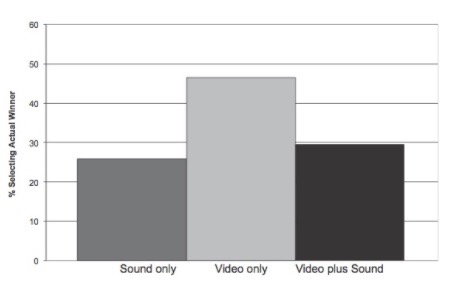Entertainment February 15, 2017


We see it when the Oscars, Grammys and Emmys roll around, when a female performer dominates the Super Bowl and when female artists take the stage: reporters fixating on the outfits of women rather than their roles, achievements or records. In 2016, the band Best Coast made headlines by calling out how unfairly female singers are treated. Now, ENTITY is exploring why those comments are still hitting all the right notes.
To find out exactly how widespread sexism – or, at the very least, a focus on women’s sex appeal over their vocals – is in the music industry, ENTITY sat down with Stacie Huckeba, an internationally renowned photographer and video producer who has been in “the biz” for 30 years. Here are all the stats, (horrifying) stories and studies you need to hear before you decide to enter the music business…or judge a female artist by her legs instead of her lungs.
Have you ever wondered why you can look at famous pop stars – ranging from Katy Perry to Britney Spears – and never see an conventionally unattractive face or body? One 2013 study may have the answer: singers are judged more by their looks than their sound. Seriously.
The researchers asked a mix of music novices and experts to choose the “winning” song out of three finalists; however, participants made their prediction by either listening to an audio-only recording, watching the videos with audio or watching the videos without audio. The results? The prediction rate was dramatically higher for those watching the video without sound. These findings imply what you may have been thinking for years: people depend on visual stimuli over the actual sound of music when rating a performance.


Via Digital News
Stacie Huckeba isn’t necessarily surprised. “Sex appeal and typical western standards of beauty are incredibly important for female artists in the music industry,” she says. “There are rare cases when this doesn’t apply, but they are very few, very far between and based almost completely on having massive financial backing. Even then, those artists are going to have a much harder time.”
The issue isn’t just that viewers are (most likely, unknowingly) judging stars based on their looks. It’s also that music reviewers can be blatantly sexist when it writing about female artists.
For instance, back in 2015, Best Coast’s Bethany Cosentino accused an article published in the San Francisco Foghorn, the student newspaper for the University of San Francisco, of being “sexist BS.” Written by David L. Garcia and titled “Best Coast, Mediocre At Most,” the article dedicates a fair portion of its review of a Best Coast concert to Cosentino’s “incredible” outfit, which made her look “sexier and badder than any rock star [he’d] seen in years.” The cherry on top of the sexist sundae? He claimed that she “barely smiled.”
And, in 2016, Bethany Cosentino wrote an essay on sexism in the music industry for “Lenny Letter” – and she left no stone unturned (or un-thrown). “People need to stop calling me a ‘whiny baby’ because I write songs about heartache and my feelings,” she writes. “Did anyone call the Beatles ‘whiny babies’ for singing the lyrics, ‘This boy wants you back again’?”
The truth is, sexism in the music industry is still alive and kicking. Lady Gaga put on a killer performance at the Super Bowl…and she was heckled only hours later for her “flabby” stomach. Carlos Santana praised Adele for winning big at the Grammys…but only by putting down Beyonce for “being very beautiful to look at” but not being a “singer, singer.” (Whatever that means). And, in the latest update to the Kesha-Dr. Luke lawsuit, emails were leaked showing that Dr. Luke blamed Kesha’s weight for not getting songs.
According to Huckeba, sexism doesn’t just apply to the singers, either. “Industry professionals don’t have as many problems with attractiveness as artists, but they are paid far less, are dismissed, overlooked for promotions, have to say something ten times to be heard and, most of the time, work ten times harder than their male counterparts,” she says.
When it comes to treating women with respect and equality, the music industry is still obviously missing the right notes.
So what do a few sexist comments or promotional oversights really mean in the big picture of the music industry?
The real problem is that talent, as Heckeba puts it, “has zero to do with sex appeal.” Just like outfits and facial expressions don’t have anything to do with music (if they did, male musicians would be at a disadvantage). Imagine reading a music review about a Kanye West concert in which half of the content is fixated on his clothes and facial expressions. It’s downright ridiculous. Don’t believe me? This HeadStuff article illustrates it pretty well.
More than that, the lack of respect female artists are receiving is a symptom of a much larger illness: the lack of representation of women in the music industry overall.
For instance, when ten major summer music festivals were analyzed for their gender ratio from 2012 to 2016, Huffington Post discovered that 66 to 93 percent of the bands were male. On a similarly sour note, only 26 percent of 2015’s Top 40 list were made up of women-only performances, and the Performing Rights Society claims that only 16 percent of its present music members (writers and creators) are women. In the UK, 61 percent of music professionals are male and, in sectors like management, promotion and live music, that number increases to 70 percent. Based on these other statistics, female representation in the US music biz is likely just as problematic.
What’s the point of all these depressing facts and figures? Basically, sexism against artists like Bethany Cosentino from the Best Coast or Lady Gaga is just the tip of the iceberg in terms of gender inequality in the music industry.
So what needs to change for women artists to finally receive the respect they deserve?
For Stacie Huckeba, there is no easy answer. However, she does have a few suggestions: “We need labels to take chances with artists whose talents speak for itself. We need management companies to fight for those artists, and we need marketing and PR firms to be more creative and stop relying on pure sex to sell records. And we need to start bringing men in on this conversation.”
Some of these movements are already happening. Organizations like SheSaid.So (a network for women in music to support, collaborate and basically kick ass together), Music Week’s Women In Music Awards (hello, female recognition!), and PRS’ Women Make Music (increasing awareness and recognition of female artists everywhere) are helping to ensure that women are receiving an equal portion of the spot light – and not because of their sex appeal.
However, we – the music fans – also need to help promote a change in music culture. We need to call for music reviews that focus on an artist’s vocals instead his or her appearance (especially if the entire article rides on the expectation that female performers should entertain their concert guests with goofy smiles and “girl talk.”) We need to call for more female music writers, producers and professionals…not to mention, adequate pay and promotions for women who are dominating their work.
The truth is, gender has no place in music performances or music critiques. It’s like talking about how red an apple looks when you’re supposed to be discussing how it tastes.
Female artists like Bethany Consentino from Best Coast may have helped start the conversation about sexism in the music industry, but now it’s our turn to keep the conversation going. The easiest message to spread? Stop looking at female musicians and start listening to them.